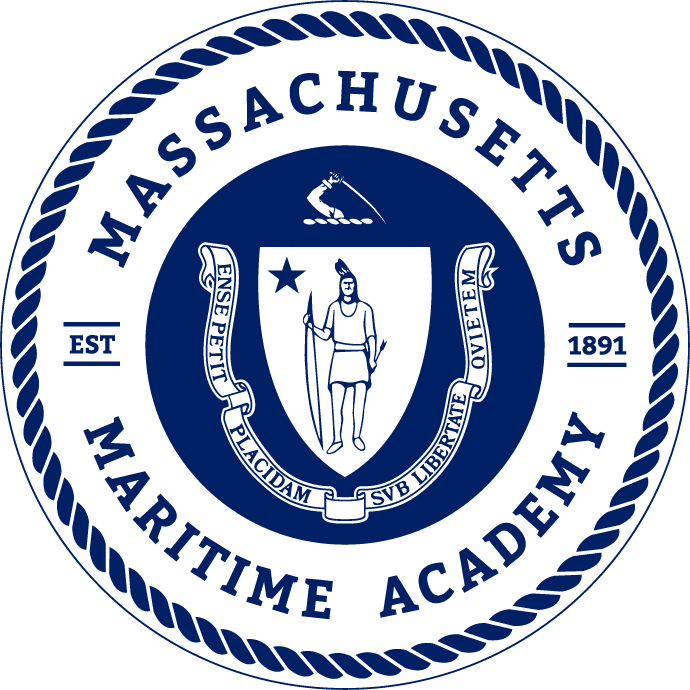Course Description
Provides an opportunity for cadets to obtain sea service and engineering watchstanding experience in a structured shipboard training program which is compliant with Chapter III of STCW and the requirements of 46 CFR. The training uses a building-block approach, bringing the cadet up to an acceptable level of proficiency in each area of required competence. Shipboard training is closely integrated with the shore-based academic curriculum at the Academy which includes a range of simulation and practical lab experiences. All phases of training are conducted by STCW Qualified Instructors and Designated Examiners.
This course consists of an approximately 52-day long shipboard experence on the training vessel including watchstanding, maintenance and training.
Entrance requirements
- Successful completion of ST‑0999 Seaterm 1
- Successful demonstration of Marine Engineering knowledge by achieving a 70% or higher on the Cadet Fireman’s Qualification Exam.
- Ability to respond to shipboard emergency signals
- Ability to safely evacuate engine room during emergency drills and situations.
- Ability to properly and safely use hand tools for maintenance and repair of shipboard equipment
- Ability to operate safely in a shipboard environment
STCW Objectives
Demonstrate knowledge and understanding of the following STCW elements:
- OICEW-A5.2 Operation of bilge, ballast and cargo pumping systems
- OICEW-A5.3 Oily-water separators operation
- OICEW-A5.3 Oily-water separators requirements
- ABE-A5.2 Basic understanding of auxiliary machinery control pressures, temperatures and levels
- ABE-A5.2 Basic understanding of main propulsion machinery control pressures, temperatures and levels
- ABE-A6.1 Ability to correctly measure and report fuel tank levels
- ABE-A6.1 Knowledge of the function and operation of fuel system
- ABE-A7.1 Ability to correctly measure and report ballast tank levels
- ABE-A7.1 Knowledge of how to report incidents associated with transfer operations
- ABE-A7.1 Knowledge of the safe function, operation and maintenance of the bilge and ballast systems
Demonstrate proficiency in the following skills:
- ABE-5G1A Trace out a piping system
- OICEW-4-1D Monitor engineering machinery
- OICEW-6-1B Operate fire pump
- OICEW-6-2A Pump bilges
- OICEW-8-2C Gear pump maintenance
- OICEW-8-2D Inspect valve manifold
- OICEW-8-2F Overhaul heat exchanger
- OICEW-8E2D Replace flange gasket
- OICEW-9-1B Monitor sewage waste treatment plant
- OICEW-9-1C Monitor oily water separator system
Topics
Instruction
- Engineroom Systems and Equipment
- Engineroom Safety
- Engineering Principles
- Engineering Watchstanding
- Disassembly, Repair, and Reassembly of Engineering Equipment.
Workshop Skills Training (Lab Operations)
- Gear pump Maintenance/Shaft Alignment. (OICEW 8-2C)
- Heat Exchangers (OICEW 8-2F)
- Valve Overhaul (OICEW 8-2E, OICEW-8E2D)
- Manifolds/Hydronics Trainer (OICEW 8-2D)
- Gauge Glass Maintenance
- Operation and Maintenance of a Wilden Pump
- Hydraulic Systems Operation
- Mechanical Seal Assembly and Operation
- Shipboard Maintenance of Engineering Systems
Workshop Skills Training (Classroom Knowledge)
- Engineroom Watchstanding
- Engineering Systems
- Refrigeration
- Lube Oil Purifier Systems
- Main Steam/Feed/Condensate
- Makeup Feed/Auxiliary Exhaust
- Auxiliary Steam Systems
- MSD/Pollution Regulations
- Oily Water Separator and Environmental Regulations
- Evaporators
- Fans and Blowers
- Compressed Air
- Pump Operations
- Grease/Bearings/Lubrication
- Bilge Operations
Watchstanding Duties
- Port & Starboard Fireman: The port and starboard Firemen and Wipers are responsible to the Boiler Engineer (Water-tender) for carrying out boiler operations.
- 3/C Upper Oiler: The Upper Oiler is responsible to the Senior Oiler for all equipment and machinery on the main operating level and above.
- 3/C Lower Oiler: The Lower Oiler is responsible to the Senior Oiler for all machinery and equipment in the lower engine room and shaft alley.
- 3/C Refrigeration/AC Oiler: The Refrigeration/AC Oiler is responsible to the Senior Refrigeration/AC Engineer for assistance in the operation of the ship’s refrigeration and air conditioning equipment.
- 3/C Evaporator Oiler: The Evaporator Oiler is responsible for assisting the Evaporator Engineer with the operation of the ship’s evaporators.
- 3/C Plant Oiler: The Plant Oiler is responsible to the Senior Oiler for assistance in the operation of the Engine Room equipment.
- 3/C AMR Oiler: The AMR Oiler is responsible to the Senior AMR Engineer for assistance in the operation of the auxiliary machinery room equipment.
- 3/C TG/SSDG Oiler: The TG/SSDG Oiler is responsible to the Upper CE for assistance in the operation of the power generating equipment.
Other objectives
- Demonstrate engineering knowledge by achieving a 70% or higher on the Cadet Oiler Qualification Exam
- Perform duties of the Cadet Oiler, and other positions
- Perform shipboard maintenance duties as assigned by the ship’s officers
